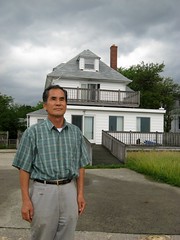Photos: Paul Wagtouicz
Since the Amato Opera closed in 2009, it has been one of the more notable vacant buildings on the Bowery. The opera’s founder died yesterday of cancer, and the building is still empty and on the market for $6.5 million.
The broker of the building at 319 Bowery, Lauren Muss, said she planned to show the property twice today. “It’s definitely interesting to people, it’s just about a price,” Ms. Muss said. “They make offers, then they disappear.” Read more…
 Harold Schrader Anthony Amato
Harold Schrader Anthony AmatoAnthony Amato, who founded the Amato Opera and trained generations of opera singers at his small theater on the Bowery, died yesterday morning on City Island. He was 91.
Rochelle Mancini, a former singer at the Amato Opera who helped Mr. Amato write his recently published memoir, said the cause was cancer.
From its founding in 1948, the Amato Opera served as a training grounds for young singers with grand ambitions. Mr. Amato was said to have a keen eye for talent, and the likes of Neil Shicoff, Mignon Dunn and George Shirley performed there before going on to play famous venues like the Metropolitan Opera and City Opera.
After stints in theaters around the city, the opera opened on the Bowery at East Second Street in 1964; a location that harkened back to the thoroughfare’s history as a poor man’s Broadway. Less than 10 years after its opening it would share the block with C.B.G.B.; a vivid example of the eclectic arts scene in the neighborhood. Read more…
 Michelle Rick Local theater producer John Kim (below) said that the owners of the Amato Opera promised that he could take over the theater when it closed in 2009. A long legal fight stemming from his falling out with the opera’s former owner is winding down.
Michelle Rick Local theater producer John Kim (below) said that the owners of the Amato Opera promised that he could take over the theater when it closed in 2009. A long legal fight stemming from his falling out with the opera’s former owner is winding down. Stephen Rex Brown
Stephen Rex BrownAs the curtain fell on the Amato Opera’s final performance in May 2009, many tears were shed and its eponymous founder received a standing ovation. But perhaps few in the audience knew that behind the scenes, a family feud had led to the end of the revered East Village opera house — a dispute that continues in court two years after the opera shut its doors.
Since the opera closed, a circuitous legal battle has ensued, which pits the charismatic owner of the opera, Anthony Amato, against his niece, Irene Frydel Kim and her husband, John Kim, who charge that Mr. Amato owes them more than 10 years worth of back wages, worth roughly $70,000. They also say in court papers that Mr. Amato owes them a portion of the $3.7 million he received through the 2009 sale of the opera building at 319 Bowery.
Mr. Amato counters that Ms. Kim misused money from a trust that he had established for her, and that she should repay the trust around $72,000.
This summer marks the end of one aspect of the dispute: under the terms of a court ruling late last year, the Kims have until September to vacate the City Island home that they once shared with Mr. Amato while helping him care for his ailing wife.
The ongoing legal wrangling has cast a cloud over the closing of the Amato Opera, which was previously portrayed publicly by Mr. Amato as inevitable, given that he is now 91.
Speaking about the matter on the record for the first time, Mr. Amato attributed his decision to close the opera to the lingering dispute with the Kims.
“I tried my best to turn it over to assistants but it wasn’t working. I just didn’t see any future in the opera the way I created it,” Mr. Amato said. “Nobody had the nerve to continue it.”
Read more…
The successor to the beloved Amato Opera, the Bleecker Street Opera, is closing its doors after two years of existence. One of the founders of the itinerant company, John Kim, wrote in an e-mail message that he and he his wife were recently “forced to leave our residence on City Island, which had been purchased and run jointly by the Amato family;” Mr. Kim said that the “home had been the headquarters of the Amato Opera for more than 40 years, and was the cradle of the Bleecker Street Opera.” The opera began as an effort by former Amato employees to carry on its legacy, and staged several performances that garnered favorable reviews.—Stephen Rex Brown






